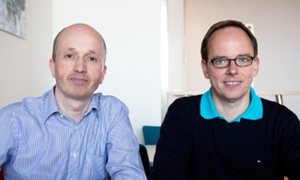3 October 2019
b) Theater or cinema? : Theater
c) Dine out or dine in? : Dine out
d) Ferrari or Fiat? : Fiat
e) Shopaholic or chocoholic? : Chocoholic
f) Culture or Nature : Nature

When you were a kid what did you want to be when you grew up? Can you tell us something about your child years.
When I was really young, I wanted to become a clown, so I could make people laugh and brighten up their day. I soon realized that a lot of people are actually afraid of clowns and therefore, I wanted to help people in another way by becoming a physician. I like to interact with people, help them to understand their problem and solve their problems. Dealing with blood however, was never my strongest point, so I decided to take one step away from medicine and become a researcher.What was your previous academic training, where did you study and why that study?
Since I was interested in how human bodies work in health and disease, I decided to study biology here in Nijmegen at the science faculty. Although I could have chosen for biomedical sciences, I wanted to have a broader background and also follow courses like plant physiology and microbiology. As a follow-up, I got accepted for the Molecular Mechanisms of Disease master also here in Nijmegen at the Medical faculty. In this challenging master, they fully prepare you for the academic world, so this was the perfect choice for me to pursue my career as a researcher.The RIMLS motto is: ‘Today’s molecules for tomorrow’s medicine’. What does this mean for you?
My PhD project does not involve the testing of new molecules or therapies, however I can relate to the motto in a more general perspective. I am working on new cell models for the rare disease myotonic dystrophy to elucidate its complex pathogenesis. Since Nijmegen is one of the hospitals specialized in this neuromuscular disease, the link between the researcher and the clinicians and patients is really short. Our findings can directly be linked to the symptoms of patients seen in the clinic.Who is your great example as scientists? And please give a motivation why.
One of the great scientist whose ideas are important for my project is Paracelsus. Although extremely controversial at times, he was a critical scientist, who made up his own theories about the world surrounding him. His famous citation: “the dose makes the poison”, was not well received by colleague scientists, but is currently still important for the toxicology field and still applies for everyday life (the human body, medicine, the environment).Which research discovery that you have made has made you most proud?
In the past year of my PhD, I did not made major discoveries yet. Hopefully, this will come soon in the future.Given unlimited finance what experiment would you perform?
The generation of new cell models to study diseases is extremely labour intensive, however they are more accurate than the current mice models. With unlimited finances, which in general equals time in research, I would improve the current cell models and develop the organ-on-a-chip technology further to have an as biomimetic and humanized model as possible. This would improve the knowledge on complex diseases and benefit the patients.What does your working area (desk, office) look like and what does it say about you (or your research)?
My desk is an organized chaos, if I have to describe it. It is in general mirroring the things I am working on at that moment, which is sometimes more crowded than other times.What type of person are you, quick insights:
a) Mac or PC? : PCb) Theater or cinema? : Theater
c) Dine out or dine in? : Dine out
d) Ferrari or Fiat? : Fiat
e) Shopaholic or chocoholic? : Chocoholic
f) Culture or Nature : Nature
Related news items

Prinses Beatrix Spierfonds grant to investigate patient stratification in myotonic dystrophy
24 January 2020 RIMLS researchers Rick Wansink and Roland Brock, both theme Nanomedicine, received a € 280,000 grant from the Prinses Beatrix Spierfonds. go to page
'Stofwisselkracht' grant for Paola de Haas and Alessandra Cambi
5 December 2019 Paola de Haas and Alessandra Cambi, theme Nanomedicine, have recently been awarded a grant from ‘Stichting Stofwisselkracht’ for their project entitled “Identification of immune-related symptoms in Congenital Disorders of Glycosylation”. go to page
Podosome nanoscale architecture redefined
20 November 2019 Koen van den Dries and Alessandra Cambi, theme Nanomedicine, revealed how the nanoscale architecture of podosomes enables dendritic cells to protrude and sense their extracellular environment. They have published their results in Nature Communications. go to page
MMD Lecturer of the year award for Alessandra Cambi
16 September 2019 At their annual MMD symposium, Alessandra Cambi, theme Nanomedicine, was chosen as lecturer of the year 2018-2019 of the Top Master "Molecular mechanisms of disease". go to page
Patient trust and participation in cell biological research
21 August 2019 Alessandra Cambi and Gert Olthuis discuss key ethical issues inherent in the development and the value of building trust and trustworthiness. go to page
